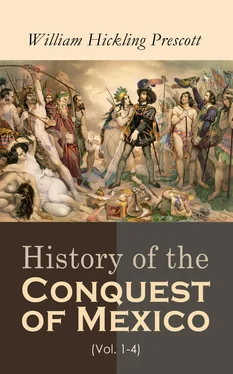Under this chivalrous spirit of enterprise, the progress of discovery had extended, by the beginning of Charles the Fifth’s reign, from the Bay of Honduras, along the winding shores of Darien, and the South American continent, to the Rio de la Plata. The mighty barrier of the Isthmus had been climbed, and the Pacific descried, by Nuñez de Balboa, second only to Columbus in this valiant band of “ocean chivalry.” The Bahamas and Caribbee Islands had been explored, as well as the Peninsula of Florida on the northern continent. This latter point had been reached by Sebastian Cabot in his descent along the coast from Labrador, in 1497. So that before 1518, the period when our narrative begins, the eastern borders of both the great continents had been surveyed through nearly their whole extent. The shores of the great Mexican Gulf, however, sweeping with a wide circuit far into the interior, remained still concealed, with the rich realms that lay beyond, from the eye of the navigator. The time had now come for their discovery.
The business of colonization had kept pace with that of discovery. In several of the islands, and in various parts of Terra Firma, and in Darien, settlements had been established, under the control of governors who affected the state and authority of viceroys. Grants of land were assigned to the colonists, on which they raised the natural products of the soil, but gave still more attention to the sugar-cane, imported from the Canaries. Sugar, indeed, together with the beautiful dye-woods of the country and the precious metals, formed almost the only articles of export in the infancy of the colonies, which had not yet introduced those other staples of the West Indian commerce which in our day constitute its principal wealth. Yet the precious metals, painfully gleaned from a few scanty sources, would have made poor returns, but for the gratuitous labor of the Indians.
The cruel system of repartimientos , or distribution of the Indians as slaves among the conquerors, had been suppressed by Isabella. Although subsequently countenanced by the government, it was under the most careful limitations. But it is impossible to license crime by halves,—to authorize injustice at all, and hope to regulate the measure of it. The eloquent remonstrances of the Dominicans,—who devoted themselves to the good work of conversion in the New World with the same zeal that they showed for persecution in the Old,—but, above all, those of Las Casas, induced the regent, Ximenes, to send out a commission with full powers to inquire into the alleged grievances and to redress them. It had authority, moreover, to investigate the conduct of the civil officers, and to reform any abuses in their administration. This extraordinary commission consisted of three Hieronymite friars and an eminent jurist, all men of learning and unblemished piety.
They conducted the inquiry in a very dispassionate manner, but, after long deliberation, came to a conclusion most unfavorable to the demands of Las Casas, who insisted on the entire freedom of the natives. This conclusion they justified on the grounds that the Indians would not labor without compulsion, and that, unless they labored, they could not be brought into communication with the whites, nor be converted to Christianity. Whatever we may think of this argument, it was doubtless urged with sincerity by its advocates, whose conduct through their whole administration places their motives above suspicion. They accompanied it with many careful provisions for the protection of the natives. But in vain. The simple people, accustomed all their days to a life of indolence and ease, sank under the oppressions of their masters, and the population wasted away with even more frightful rapidity than did the aborigines in our own country under the operation of other causes. It is not necessary to pursue these details further, into which I have been led by the desire to put the reader in possession of the general policy and state of affairs in the New World at the period when the present narrative begins. [463]
Of the islands, Cuba was the second discovered; but no attempt had been made to plant a colony there during the lifetime of Columbus, who, indeed, after skirting the whole extent of its southern coast, died in the conviction that it was part of the continent. [464]At length, in 1511, Diego, the son and successor of the “Admiral,” who still maintained the seat of government in Hispaniola, [465]finding the mines much exhausted there, proposed to occupy the neighboring island of Cuba, or Fernandina, as it was called in compliment to the Spanish monarch. [466]He prepared a small force for the conquest, which he placed under the command of Don Diego Velasquez; a man described by a contemporary as “possessed of considerable experience in military affairs, having served seventeen years in the European wars; as honest, illustrious by his lineage and reputation, covetous of glory, and somewhat more covetous of wealth.” [467]The portrait was sketched by no unfriendly hand.
Velasquez, or rather his lieutenant, Narvaez, who took the office on himself of scouring the country, met with no serious opposition from the inhabitants, who were of the same family with the effeminate natives of Hispaniola. The conquest, through the merciful interposition of Las Casas, “the protector of the Indians,” who accompanied the army in its march, was effected without much bloodshed. One chief, indeed, named Hatuey, having fled originally from St. Domingo to escape the oppression of its invaders, made a desperate resistance, for which he was condemned by Velasquez to be burned alive. It was he who made that memorable reply, more eloquent than a volume of invective. When urged at the stake to embrace Christianity, that his soul might find admission into heaven, he inquired if the white men would go there. On being answered in the affirmative, he exclaimed, “Then I will not be a Christian; for I would not go again to a place where I must find men so cruel!” [468]
After the conquest, Velasquez, now appointed governor, diligently occupied himself with measures for promoting the prosperity of the island. He formed a number of settlements, bearing the same names with the modern towns, and made St. Jago, [469]on the southeast corner, the seat of government. [470]He invited settlers by liberal grants of land and slaves. He encouraged them to cultivate the soil, and gave particular attention to the sugar-cane, so profitable an article of commerce in later times. He was, above all, intent on working the gold-mines, which promised better returns than those in Hispaniola. The affairs of his government did not prevent him, meanwhile, from casting many a wistful glance at the discoveries going forward on the continent, and he longed for an opportunity to embark in these golden adventures himself. Fortune gave him the occasion he desired.
An hidalgo of Cuba, named Hernandez de Cordova, sailed with three vessels on an expedition to one of the neighboring Bahama Islands, in quest of Indian slaves. [471](February 8, 1517.) He encountered a succession of heavy gales which drove him far out of his course, and at the end of three weeks he found himself on a strange and unknown coast. On landing and asking the name of the country, he was answered by the natives, “ Tectetan ,” meaning, “I do not understand you,”—but which the Spaniards, misinterpreting into the name of the place, easily corrupted into Yucatan. Some writers give a different etymology. [472]Such mistakes, however, were not uncommon with the early discoverers, and have been the origin of many a name on the American continent. [473]
Cordova had landed on the northeastern end of the peninsula, at Cape Catoche. He was astonished at the size and solid materials of the buildings, constructed of stone and lime, so different from the frail tenements of reeds and rushes which formed the habitations of the islanders. He was struck, also, with the higher cultivation of the soil, and with the delicate texture of the cotton garments and gold ornaments of the natives. Everything indicated a civilization far superior to anything he had before witnessed in the New World. He saw the evidence of a different race, moreover, in the warlike spirit of the people. Rumors of the Spaniards had, perhaps, preceded them, as they were repeatedly asked if they came from the east; and wherever they landed they were met with the most deadly hostility. Cordova himself, in one of his skirmishes with the Indians, received more than a dozen wounds, and one only of his party escaped unhurt. At length, when he had coasted the peninsula as far as Campeachy, he returned to Cuba, which he reached after an absence of several months, having suffered all the extremities of ill which these pioneers of the ocean were sometimes called to endure, and which none but the most courageous spirit could have survived. As it was, half the original number, consisting of one hundred and ten men, perished, including their brave commander, who died soon after his return. The reports he had brought back of the country, and, still more, the specimens of curiously wrought gold, convinced Velasquez of the importance of this discovery, and he prepared with all despatch to avail himself of it. [474]
Читать дальше












